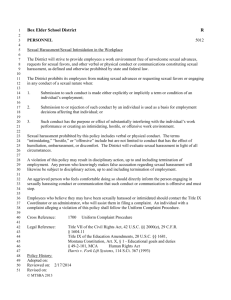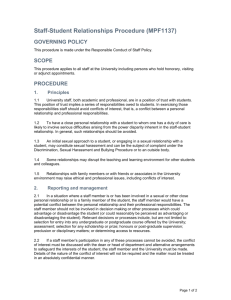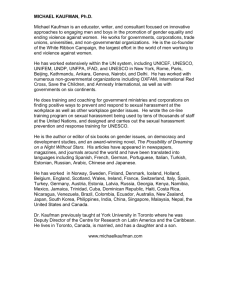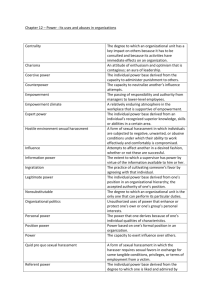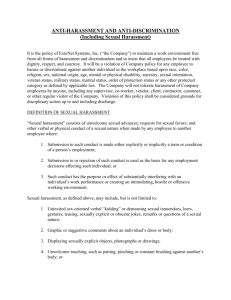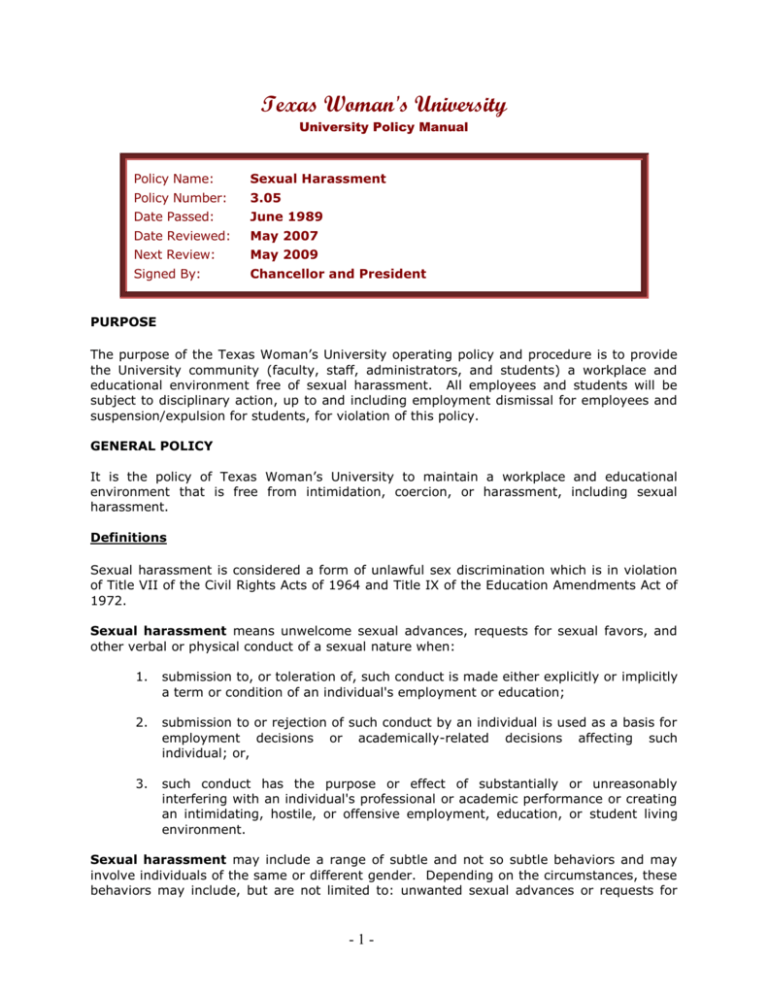
Texas Woman's University
University Policy Manual
Policy Name:
Sexual Harassment
Policy Number:
3.05
Date Passed:
June 1989
Date Reviewed:
May 2007
Next Review:
May 2009
Signed By:
Chancellor and President
PURPOSE
The purpose of the Texas Woman’s University operating policy and procedure is to provide
the University community (faculty, staff, administrators, and students) a workplace and
educational environment free of sexual harassment. All employees and students will be
subject to disciplinary action, up to and including employment dismissal for employees and
suspension/expulsion for students, for violation of this policy.
GENERAL POLICY
It is the policy of Texas Woman’s University to maintain a workplace and educational
environment that is free from intimidation, coercion, or harassment, including sexual
harassment.
Definitions
Sexual harassment is considered a form of unlawful sex discrimination which is in violation
of Title VII of the Civil Rights Acts of 1964 and Title IX of the Education Amendments Act of
1972.
Sexual harassment means unwelcome sexual advances, requests for sexual favors, and
other verbal or physical conduct of a sexual nature when:
1.
submission to, or toleration of, such conduct is made either explicitly or implicitly
a term or condition of an individual's employment or education;
2.
submission to or rejection of such conduct by an individual is used as a basis for
employment decisions or academically-related decisions affecting such
individual; or,
3.
such conduct has the purpose or effect of substantially or unreasonably
interfering with an individual's professional or academic performance or creating
an intimidating, hostile, or offensive employment, education, or student living
environment.
Sexual harassment may include a range of subtle and not so subtle behaviors and may
involve individuals of the same or different gender. Depending on the circumstances, these
behaviors may include, but are not limited to: unwanted sexual advances or requests for
-1-
sexual favors; sexual jokes and innuendo; verbal abuse of a sexual nature; commentary
about an individual’s body, sexual prowess or sexual deficiencies; leering, catcalls or
touching; insulting or obscene comments or gestures; display or circulation in the workplace
of sexually suggestive objects or pictures (including through e-mail or other electronic
means); and other physical, verbal or visual conduct of a sexual nature.
Student, as used in this policy, refers to any person who is registered for at least one
course or program offered by the University and who is neither a faculty member, nor a
member of the TWU staff.
Faculty, as used in this policy, refers to any person who is either the instructor of record
for any class or program offered by the University or who is functioning in that capacity.
Faculty also includes all administrative personnel who hold academic appointments, as well
as Graduate Teaching Assistants.
Staff, as used in this policy, refers to all employees of the University who are not members
of the faculty.
In any situation in which the roles overlap, the context in which an individual is functioning
at the time a sexual harassment incident is alleged to have occurred will define her/his
category or classification. Where conflict exits the Office of Human Resources (OHR) will
determine position role category.
Complainant – the person making the formal complaint of sexual harassment.
Respondent – the person accused of sexual harassment.
Consensual Relationships - Staff in supervisory positions and other positions of authority
and faculty must be sensitive to the potential for sexual harassment as well as conflicts of
interest in personal relationships with subordinate faculty and staff members or with
students. Even among peers, conflicts can arise. It is the policy of the University that
consensual relationships between faculty or staff members in positions of authority and their
subordinates or their students are not permitted.
General Principle Underlying Policy
The guiding principle underlying this policy is to consider all facts related to claims of sexual
harassment and take corrective action as deemed appropriate in the best interests of Texas
Woman’s University with respect to its policies and procedures and federal and state laws
regarding sexual harassment.
A complaint of sexual harassment may be resolved at any stage in the process. If a claim
of sexual harassment is resolved, a statement to that effect will be acknowledged by both
the complainant and the respondent. A copy of the statement of resolution will be retained
by the complainant and the respondent and filed with the Equal Employment Opportunity
(EEO) Officer in the Office of Human Resources (OHR). In general, matters under this
policy will be handled in an expeditious manner.
Procedure for Filing a Complaint
In the event of a question, complaint, or allegation regarding sexual harassment, an
employee should report the matter to the OHR immediately. Students should speak to their
-2-
supervisor/department chair to resolve the issue.
However, if the student is not
comfortable discussing the matter because the supervisor or department chair is involved,
the student should contact the OHR. Students may also contact the Office of Student Life
for information with this process.
If any supervisor, administrator, or academic chair, regardless of reporting structures,
becomes aware of an incident of sexual harassment, the matter should be discussed with
her/his superior and the Office of Human Resources immediately. If the complaint is with
the immediate supervisor, contact the Office of Human Resources directly and immediately.
Supervisors, administrators, and academic chairs are cautioned to consider allegations of
sexual harassment as a serious matter which should be resolved expeditiously and
confidentially to minimize the potential University and personal liability.
All complaints concerning matters of sexual harassment will be brought to the attention of
the Equal Employment Opportunity (EEO) Officer, or his/her appointed designee, in the
OHR. As relates to procedures above, a person wishing to file a complaint of sexual
harassment must contact the EEO Officer or his or her designee and file a signed, written
statement within 60 days following the incident.
Investigation and Complaint Resolution
Once the OHR has received and reviewed the complaint and determined if the allegations
rise to the definition of sexual harassment, an investigation will begin. The respondent will
be informed of the details of the allegation. Any identified witnesses with pertinent
information will be interviewed. Once the investigation has been completed the EEO Officer,
or his/her appointed designee will prepare a summary report of the investigation and
forward to the appropriate University official (see below) with a recommended resolution
and corrective action, if appropriate.
For claims where the respondent is a non-faculty employee, a summary report, a
resolution and recommended corrective disciplinary action for the respondent will be
forwarded to the supervisor, department head, and the divisional vice president.
For claims where the respondent is a student, the summary report will be forwarded
to the Vice President of Student Life, or her or his designee, for resolution and
corrective action.
For claims where the respondent is a faculty member a summary report and a
recommended resolution will be forwarded to the Office of the Provost, or her or his
designee. The Office of the Provost, or his/her appointed designee will review the
recommended resolution and corrective disciplinary action for the respondent.
In situations where the respondent is an unrelated third party (a person outside the
University), the OHR will notify the appropriate University Officials regarding the facts of the
claim and will work with those officials to resolve the complaint. In situations where an
unrelated third party is subjected to sexual harassment by a member of the TWU
community, the process outline above will be followed.
In situations where the complainant is a human resources staff member within the OHR
and the claim is against the EEO Officer, the complainant will notify the Vice President of
Finance and Administration regarding the facts of the claim and will work with this official to
resolve the complaint.
-3-
Once all allegations have been investigated and a resolution decision is reached, the EEO
Officer, or his/her appointed designee will notify the Complainant of the findings in the case
and the resolution decision.
The EEO Officer or his/her appointed designee will continue to monitor the circumstances
surrounding the complaint to ensure that the situation has been remedied.
In cases where the EEO Officer or his/her appointed designee is not able to substantiate an
allegation of sexual harassment, a letter/memo to that effect will be sent to the complainant
with a copy to the respondent, and the respondent’s supervisor. A copy will be kept on file
with the EEO Officer in the OHR.
Official Records of Complaint
All complaint records are to be filed exclusively in the Office of Human Resources except
when students are sanctioned, a record will exist in the Office of Student Life.
Retaliation
Retaliatory action of any kind is prohibited against a witness, or other persons providing
testimony, or against the complainant seeking redress under the applicable policies,
procedures, and laws dealing with sexual harassment. Such retaliatory action shall be
regarded as a separate and distinct cause for complaint and if substantiated, will result in
disciplinary action up to and including employment dismissal or suspension for students.
Confidentiality
All complaints of sexual harassment will be kept confidential to the extent possible while
conducting an investigation and resolving the matter.
Corrective Disciplinary Action
Substantiated violations of TWU’s policy on sexual harassment will include disciplinary
corrective action up to and including employment termination for employees and suspension
or expulsion from the University for students.
Civil Sanctions
Sexual harassment is illegal under Title VII of the Civil Rights Acts of 1964 and Title IX of
the Education Amendments Act of 1972. In some cases, sexual harassment may be subject
to prosecution under the criminal sexual conduct law and personal liability.
Filing of False Complaints of Sexual Harassment
Any TWU employee or student who knowingly and intentionally files a false complaint under
this policy will be subject to corrective disciplinary action up to and including employment
dismissal, or suspension or expulsion for students, from the University.
Dissemination of Policy
The policy will be disseminated annually to all faculty, employees and students, and is
available through the OHR. The University will periodically educate and train employees and
-4-
supervisors regarding this policy, including conduct that would constitute a violation of this
policy. Pursuant to Texas Labor Code, Section 21.010, new employees shall receive this
training and this policy within 30 days of hire. All employees shall participate in a refresher
training course every two years. Such training shall be documented in each employee’s
personnel file via either a copied electronic or hard copy version of the employee statement
of training.
The EEO Officer duties and responsibilities are assigned by the policy and TWU to the
Associate Vice President for Human Resources
The Vice President for Finance and Administration will review this Operating Policy with
recommendations forwarded through normal administrative channels to the Chancellor and
President.
-5-




